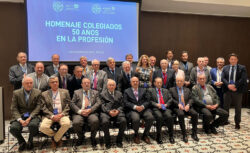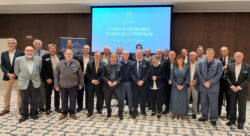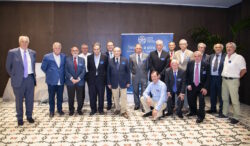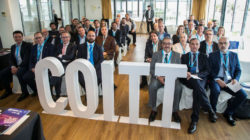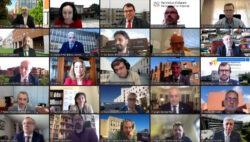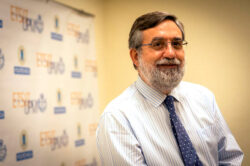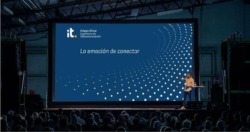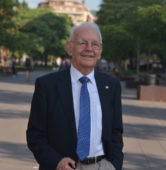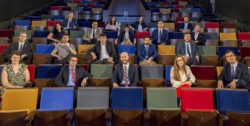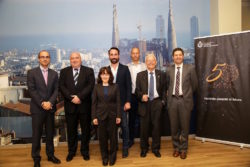Ingenieros de Telecomunicación: 100 años conectando emociones
Arranca la celebración del centenario del título de Ingeniero de Telecomunicación con un debate online sobre el pasado, presente y futuro de la profesión.
El pasado miércoles 22 de abril tuvo lugar el primer evento dentro de la amplia serie de celebraciones previstas a lo largo de este año para conmemorar el centenario de la profesión de Ingeniero de Telecomunicación. La fecha se ha escogido por coincidir con el día en que se hizo oficial el nuevo título de Ingeniero de Telecomunicación en 1920.
El evento consistió en una sesión virtual de debate entre cuatro destacados profesionales sobre el pasado, presente y futuro de la profesión y su relevancia para la sociedad especialmente en momentos de dificultad como la actual pandemia.
Marta Balenciaga, decana-presidente del Colegio Oficial Ingenieros de Telecomunicación (COIT) y presidenta de la Asociación Española de Ingenieros de Telecomunicación (AEIT) dio la bienvenida a los participantes recordando que el centenario servirá “para hacer un merecido reconocimiento a todos los profesionales que nos han precedido y que han hecho avanzar esta profesión durante los últimos 100 años haciéndola más grande”.
Grandes hitos
En el inicio del debate, moderado por el Ingeniero de Telecomunicación Luis García Millán, se ha hablado sobre los grandes hitos técnicos del último siglo relacionados con la profesión. En este repaso han surgido avances concretos, como el transistor o la simbiosis entre Internet y el móvil, y otros más genéricos como “El desarrollo de la aviación comercial tal y como la conocemos hoy en día no sería posible sin las comunicaciones”, en palabras de Alexia Rodríguez, miembro de la Junta del COIT, coordinadora del GT Mujer IT del COIT y Product Owner en ArcelorMittal.
A continuación, se valoró la importancia social del Ingeniero de Telecomunicación en el momento actual. Los participantes han subrayado la falta de conocimiento social sobre la profesión y, especialmente, sobre su relación con amplios sectores de la economía donde es una pieza transversal imprescindible. En este sentido, Emma Fernández Alonso, consejera independiente de Metrovacesa y Axway, ha recordado que “nunca es suficiente el ejercicio de comunicar a la sociedad quiénes somos y qué hacemos”.
Pandemia y digitalización
Durante el encuentro también se debatió sobre el papel de la profesión ante la crisis creada por el COVID-19, destacándose que las circunstancias han obligado a que el teletrabajo, la teleducación y la telemedicina hayan conocido una expansión sin precedentes. “No es posible imaginar un confinamiento como el que estamos viviendo sin todas estas herramientas que han permitido hacer pedagogía digital en muy pocas semanas”, según Miguel Carlos Castillejo Calvo, concejal de Transparencia e Innovación Tecnológica en el Ayuntamiento de Alcalá de Henares y Business Senior Manager en BBVA.
Los participantes coincidieron en señalar que los Ingenieros de Telecomunicación pueden contribuir a que las personas se convierten en ciudadanos digitales y a mitigar la brecha digital que provoca exclusión. Del mismo modo, constataron que “el teletrabajo masivo ha funcionado” y que muchas personas se están planteando en continuar con esta opción cuando la crisis haya remitido.
La sesión se cerró con una mirada al futuro. En ella, los participantes han señalado las grandes tendencias que dominarán durante los próximos años en el ámbito de las tecnologías para la información y las comunicaciones: el desarrollo del Big Data o el Internet de las cosas; la lucha por nuevos modelos de producción dentro de la Industria 4.0; la ciberseguridad, o el debate entre seguridad y libertad.
Los expertos aseguraron que la sociedad estará cada vez más hiperconectada. “En aquello que se pueda, todo se digitalizará, se automatizará, se conectará y se analizará”, afirmó Julio Linares López, patrono de la Fundación Telefónica y presidente de la Comisión de Sociedad Digital de la CEOE. En este sentido añadió que “el Ingeniero de Telecomunicación del futuro deberá ser muy flexible y creativo para adaptarse no solo a los cambios sino a las disrupciones”.
La sesión concluyó con la idea compartida de que la profesión de Ingeniero de Telecomunicación debe preocuparse de la tecnología, pero sin olvidar “la dimensión humanista asociada a ella”; en definitiva, las personas. Incluso, se mencionaron las empresas llamadas biónicas, aquellas que son capaces de encajar con éxito la tecnología y el talento humano. Igualmente, se apeló a la esperanza y al optimismo ante el avance tecnológico.
Para 2020, el COIT/AEIT, con el apoyo de toda su estructura territorial, ha puesto en marcha una serie de iniciativas y eventos con un enfoque común bajo el lema Ingenieros de Telecomunicación: 100 años conectando emociones. Cuentan con la colaboración de universidades que imparten el título de Máster Universitario en Ingeniería de Telecomunicación, de empresas del sector y de la Administración Pública, así como del amplio colectivo de colegiados.
Did you like this article?
Subscribe to our NEWSLETTER and you won't miss anything.




